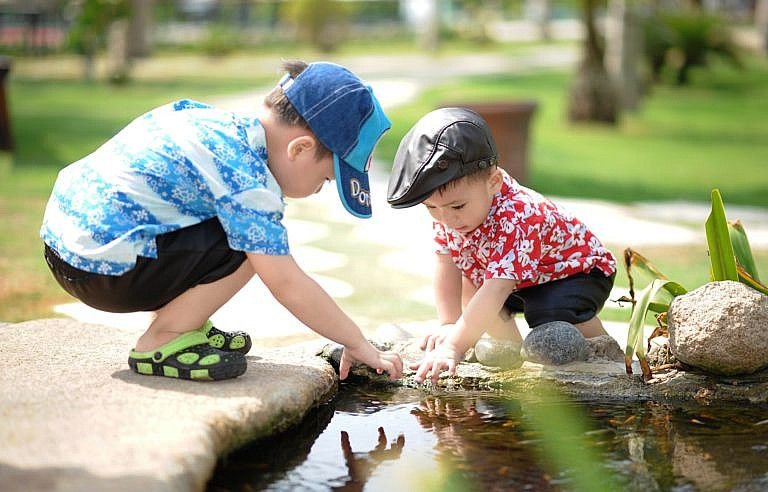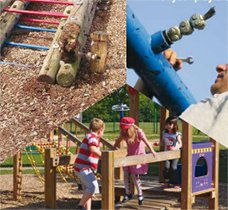Whether toing and froing on a spring rocker or hanging from a climbing net, encouraging your child to play is incredibly important. This is because everything they do offers them a chance to explore the world around them and learn more about themselves.
Cooperative play is a key stage in your child’s development. Keep reading to find out what it is and why it’s important.
What is cooperative play?
Generally defined as any form of organised activity that encourages children to work towards a common goal, cooperative play includes activities like building sandcastles and putting on plays, and usually requires children to distribute roles and responsibilities between themselves.
Cooperative play is a powerful framework for teaching children new things and can inspire them to engage in other brain-boosting activities. There are five stages that children work through before they are ready to play cooperatively. Each stage teaches a child something new and aids in the development of social skills. These five stages aren’t set in stone, so they may not necessarily appear in this order. But each stage is generally observed in a child before they are ready to play cooperatively.
Unoccupied play
To the casual observer, unoccupied play can look like a child is lost in a daydream or moving randomly. However, this definitely is play and an important stage in your child’s early development.
Solitary play
Independent play is very easy for children and is often the most common type of play exhibited by those aged 2 or 3. At this age, children still tend to focus inwardly and lack the communication skills to engage in more sophisticated play. Solitary play is important as it teaches children self-sufficiency and how to keep themselves entertained.
Onlooker play
Sometimes mistaken for shyness, onlooker play is actually a normal stage in childhood development and typically involves children observing others and not engaging in activities. It’s fairly common in children who are still learning how to communicate their thoughts and feelings, and offers children a temporary break away from the group to learn the social skills they need.
Parallel play
When 3-year-olds play, it can sometimes feel like they’re uninterested in each other or being standoffish. The truth is these children are actually taking part in something called parallel play, an activity where children play side by side but don’t interact. During parallel play, young children take things in turn and watch what others are doing. It’s also common for them to mimic each other subconsciously.
Associative play
This is the final stage before children are ready to play cooperatively and is very similar to parallel play. In this phase, however, little ones are more willing to communicate ideas and get involved in what other children are doing.
Advantages of cooperative play
 Cooperative play is important for young children as it sets the stage for many of life’s challenges. Learning how to work together early on can help a child assimilate into a group, cope with failures and engage in meaningful personal relationships. Children who fully engage in cooperative play also stand to learn the difference between competition and cooperation and recognise their own self-worth outside of winning a game or coming first in a competition.
Cooperative play is important for young children as it sets the stage for many of life’s challenges. Learning how to work together early on can help a child assimilate into a group, cope with failures and engage in meaningful personal relationships. Children who fully engage in cooperative play also stand to learn the difference between competition and cooperation and recognise their own self-worth outside of winning a game or coming first in a competition.
Showing your child how to work and play cooperatively can teach them a great deal about psychology. Researchers Brownell et al believe “Cooperative peer play compels children to take the other’s perspective, being a potential catalyst for empathy development“. And this is thought to play a significant role in the development of a child’s ‘theory of mind’, a crucial step in being able to think about the mental states of others.
Other benefits of cooperative play include:
- Sharing
- Listening and speaking
- Problem-solving skills
- Leadership
- Teamwork
How to encourage cooperative play
At home
Cooperative play is largely social and requires a great deal of social competence. As such, it’s important to reinforce positive social behaviours before encouraging a child to engage in cooperative play.
A great place to start is in the kitchen. Here you can encourage children to complete tasks and work towards a common goal. Another way is to sneak games into common household chores. By tasking two children with tidying one room within a certain time frame, for example, you can incentivise their cooperation and help them see boring tasks in a new light.
In school
One of the best things about sending your child to nursery or preschool is the opportunity to socialise with other children and take part in cooperative play. Early years centres often have fun things like workstations and mud kitchens to play with, and these can encourage children to use their imagination and play cooperatively. What’s more, many aspects of the EYFS framework, which is mandatory for all early years providers in the UK, are designed to help children develop socially.
Outdoors
A fun seasonal activity is to build a snowman. This forces children to work together and decide on things like shape, style and size. If it isn’t winter, scavenger hunts are a fun and exciting way to motivate children to play outdoors and work together on finding hidden items.
Trips to the park are an excellent opportunity for cooperative play. Lots of playgrounds feature trim trails that are perfect for team building. Plus, many playgrounds have themed equipment where children can roleplay as buccaneers aboard a pirate ship or knights storming a castle.
Cooperative play is a key milestone in a child’s development and is essential for them to grow into healthy, happy adults. Following the six stages of play development will help you track their progress and mean you can spur on socially positive behaviours at the right time. Incorporating cooperative play into your child’s life will also help them better understand the people around them and demonstrate empathy more effectively.




